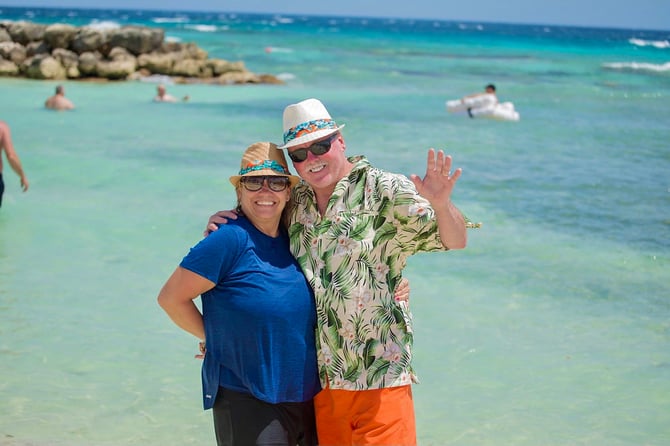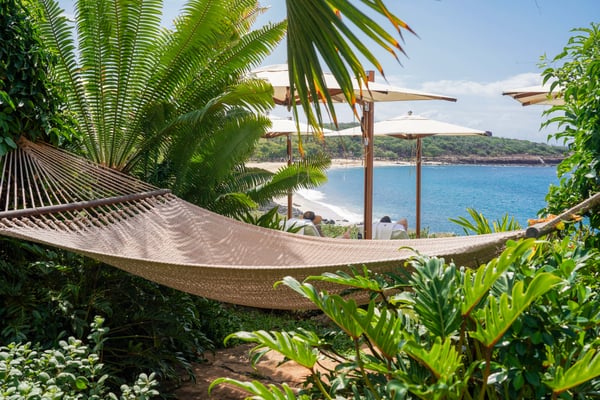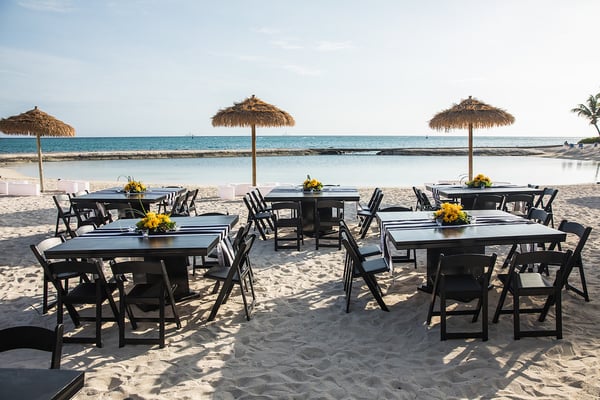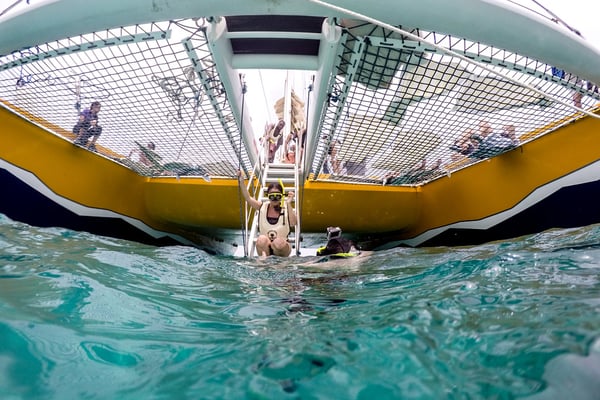Show Notes
Talking with Justin Myers, Head of Commercial and Hospitality Client Group, we discuss everything incentive travel. From the trends being seen for incentive trips to the value of planning these kinds of events, we cover all the reasons why you should be planning an incentive program. Topics include:
- Benefits of incentive programs during the Great Resignation
- Current trends and important elements of a successful incentive trip
- Top destinations for incentive trips
- How incentive programs offer real ROI
Subscribe to The Events Experience, and create JOY wherever you go!

Transcript
Hi, and welcome to The Events Experience, where we take a deep dive into everything event planning. I work for Bishop-McCann, an agency devoted to creating JOY through meetings, incentives, and events for big name brands. On this podcast, myself and our company's experts will discuss all things events, so keep listening to hear all about the latest tips and trends for virtual, live, and hybrid events.
Hi, everybody! In this episode, I'll be talking to Justin Myers, our head of commercial and hospitality client group, who has more than 15 years of experience in brand, campaign, and event management, along with a depth of knowledge on incentive travel. Today, we'll be discussing incentive trips and how planning this kind of program can benefit businesses. Thank you for being here, Justin!
Thank you for having me, Brenna! I'm excited to be doing my first podcast with you, and incentive travel in particular is one of my favorite topics, so really excited to dive in.
Awesome! So to start off our conversation, I'd like to touch on the topic of the Great Resignation, which has resulted in millions of people leaving their companies. Most of these resignations are due to dissatisfaction with company culture. So how can we, as event professionals, help companies that are struggling with this issue? Could an incentive program act as a reason for them to stay?
It's a really good question, and the Great Resignation and employee retention is an issue at the top of every executive's desk right now. When you look at unemployment rates being at all time lows. First quarter of this year, we were hovering around 3.5%. So employees have choices as to where they can work. And throughout the pandemic, I think things became even more paramount as to what's important beyond salary. What are those non-cash items that are important as a benefit to us individually? If you look at remote work, for example, in 2019, roughly 6% of employees worked from home. Obviously, everybody at some point went to work from home, and we hit peaks as high as 70% in 2021. Now we're hovering around 25-35%, and employees are looking at what are those benefits that are important. They're looking at time off, wellness programs, child care benefits, flexible work options. Incentive travel is one of those non-cash benefits that can really drive retention. There's data that supports that. Culturally, it helps build rapport with executives, leaders, and producers within an organization. So I think it's a great tool for executives to look at as they balance out all of those different benefits that they're providing their employees.
Right. Because of this, have you seen a boost in demand for incentive trips?
Yeah, absolutely. I mean, obviously, the incentive travel industry was hit really hard with the pandemic, but starting through the first half of this year, we've really seen a strong rebound in demand. I think that started first with leisure travel and each individual's willingness and openness to travel. That really opened up first, so we've seen really high demand there. As you look at companies then following suit and opening up incentive travel and reopening their programs, there was a lot of virtual, a lot of online gifting, a lot of things went to cash or bonuses. But we've really seen in the industry that desire and demand for incentive travel come back.

So along with this increase in demand for incentives, what are some trends that we're seeing with incentive trips?
So a couple of things, and I'll go back to talking about kind of individual desires and willingness to travel. There's an IRF destination survey, the Incentive Research Foundation. It's a great tool and a great resource for anybody looking at starting a new incentive program or justifying an existing program – really adding data, parameters, psychology, and research behind those decisions. But in that 2021 survey, 80% of the respondents found group travel to be extremely motivating. In 2022, that went from 80% to 91%. So that openness and desire to travel is there.
So what we've seen as far as trends in the industry, we've seen compression of hotel inventory. Leisure demand travel is at an all time high, so hotel availability and their prioritization of leisure travel has caused rates to go up. You've also got inflationary pressures in the market right now. So we've seen that need to increase cost and increase budgets to keep incentive programs at the same levels as they were in years past. Another trend, I would say in 2022, we've seen a higher demand for domestic incentive locations. Especially starting out the year, there were more barriers to entry with certain countries, with testing requirements, vaccine requirements, vaccine passports, all those sorts of questions. So we saw a shift from typical international destination programs looking more domestically. I would say now that’s pivoted in 2023 and even later this year. We're seeing really strong demand now that the government has opened things up. Travel is a little easier, so that's not a barrier for companies to consider international locations.
Right. So diving a little bit more into the details, what are the most important elements of a successful incentive program?
So there's so many things. At Bishop-McCann we create JOY, and we see that in particular with attendees on incentive travel programs. What we try to do when we approach any incentive is we want to make attendees feel special. We want them to be the VIPs. They've earned this through their work. They've worked hard for it. At every single touch point that we have with those attendees, we want them to leave feeling like they are important, they are valued. So we design that in our programs. We design it into our communications with attendees. We design it in everything from the airport arrival and the greeting to the arrival at the resort to gifting experiences and personalized notes from executives. Anything that we can do throughout the journey to make that attendee feel special is a priority for us. Then we look at "wow factor." You know, incentive travel often is about what we can give these award winners that they can't get on their own? Or maybe they wouldn't get on their own. So what can you do with entertainment? What can you do with décor and creating something special, so that they feel celebrated? I'll reference another study here done by IRF. They surveyed Incentive Travel Award winners and what the most important things are for them: having downtime on a program. So giving them plenty of time to relax, not overscheduling them, letting them enjoy the trip - that was the number one thing that they listed. The ability to bring a guest, to bring a spouse, to bring a friend, or a significant other, that really increases the perceived value for the award winner. Having luxury accommodations and experiences, having additional spending money to cover out-of-pocket expenses, and then having a destination that you've never been to before. I mean, one of the most exciting things about incentive travel is opening up that world of travel and taking award winners to a new destination, so they get to leave a little piece of their heart somewhere across the world.

Right, right. Talking about those destinations that they haven't been to, what are some top destinations clients should consider for their next incentive trip?
You know, it really depends on the program. I think you have to look at the number of attendees that you have. You have to look at the length of the program. Obviously, if you've got a two or three night incentive program, traveling to Europe or traveling to Hawaii might be more challenging. If it is a five-night or a four-night program, you can open it up and look at Western Europe, look at Hawaii. But obviously the Caribbean and the opening back up of the Caribbean, those destinations are really hot right now. Looking at Mexico, it's always a top incentive travel destination - whether it be the west coast of Mexico and Cabo or Punta Tomita, Puerto Vallarta, Cancun, Riviera Maya, or Playa del Carmen area. There are so many great options, and I love it when clients want to think outside the box, too, and maybe not do the typical fun-and-sun type of a program. But looking at a winter or a mountain destination, looking at Canada and really thinking outside the box. Doing a train tour across Canada to Banff. So there's so many fun things that you can do and so many great destinations.
Yeah, and as I'm sitting here in Missouri right now, I'm not going to lie, any of those destinations sound pretty amazing!
It all sounds great, right?
Yeah, yeah. So why do incentive programs work so well would you say?
So there's really great research out there on this. I would say to simplify that research, it comes down to the perceived value of the award itself. When you're comparing cash compensation to non-cash compensation, often times there's not separability in a cash incentive. If you get a bonus, you know, you tend to put that money in your checking account. It's going to go to pay the bills. It's going to pay the mortgage. It's going to pay the increased gas prices and grocery prices. With incentive travel, it's a little harder for attendees to put a dollar amount on that. So often times there's a higher perceived value with those attendees than what the company is actually spending on the trip. I think there's a couple of reasons for that.
I think if you look at justifiability, this may be a trip that the attendee wouldn't pay their own money for. So the fact that the company is providing this to them, it's justifiable. They can go do it. They can go experience it. There's no guilt with it, so there's this higher perceived value that comes with that. Then there's also social reinforcement. When you talk cash compensation, we don't go around talking about how much our bonus was. There are social stigmas related to that. But saying, "I won a trip to Cabo," or "I get to take my wife or my friend to go do this." There's that social reinforcement, both externally as well as internally at the companies, that make a really big impact on the motivating factor for incentive travel when compared to cash awards.

Right. So speaking of incentives working, do incentive trips offer real ROI?
I think that's a really good question, and I think it's different from organization to organization. I think the most important thing is to look at what your program objectives are. You've got to have clear goals in what you're trying to motivate. Is it a sales group and you're trying to motivate revenue growth? Is it an operations group where you're trying to motivate specific behaviors, taking training, taking each of those steps and completing the things that they need to do? I think incentive design and the program design is also key to delivering ROI. You have to look at your base of employees that you're trying to influence.
If your program is designed to only award the top performers, oftentimes it's going to be only those top 5% every time. So the goal is to award enough (15-20% of your top performers), so that you're motivating that middle group of producers. It has to seem achievable to them to reach it, and that's when you're really going to see the ROI because you're motivating a bigger subset of your total audience. So yeah, I think developing those clear benchmarks, what your program objectives are. Are you looking at outcomes versus behaviors, and designing your program around that will absolutely deliver ROI, and 90% of US organizations use some type of non-cash incentive for their employees with incentive travel being one of those, obviously.
Right. So just to wrap up this podcast, we're going to end on a fun question. If you had to pick one place to recommend to a client that is your favorite for incentive travel, where would that be?
So do I have to name one? That is really the question because it is so hard!
You know, there's so many great destinations that I've been lucky to experience incentive programs. Marbella, Spain, is one of my all time favorites. Just the art, the culture, and the food is amazing. I love the Virgin Islands, U.S. Virgin Islands, British Virgin Islands, and the ability to hop on a catamaran to island hop and go see some of the great island beach bars. I could go on and on, but I know you asked me one and I've already named two, so I'll just leave it at that.
Well, like I said before, both of those places sound pretty fantastic. Thank you so much for joining me today and for providing those insights on incentive travel!
Yes, thank you so much for having me, Brenna!
Thanks for tuning in to this episode of The Events Experience. Don't forget to subscribe to our podcast, and create JOY wherever you go!
